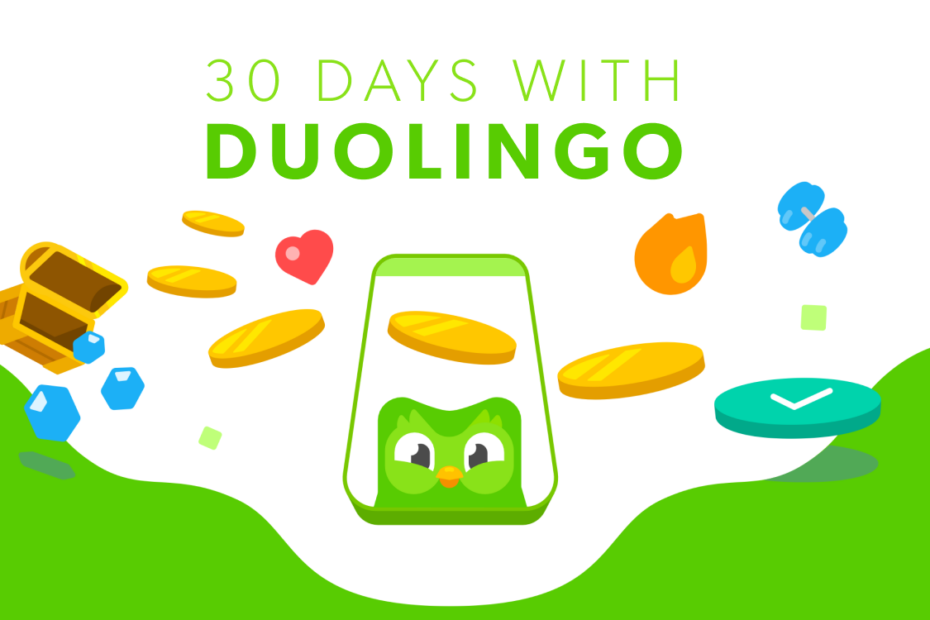Fancy moving beyond your mother tongue? This app gives you a start
Learning new languages isn’t merely practical. Science shows it’s good for brain health too, improving focus, memory and even processing.
But learning a new language can be hard and time-consuming. I wanted to see how far I could get in ‘gamified’ app Duolingo, squeezing sessions into odd moments I’d otherwise waste playing games.
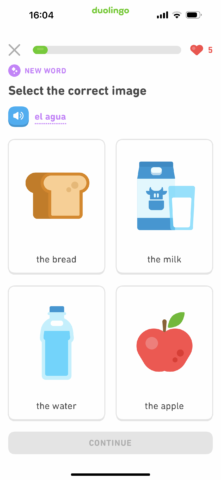
Duolingo pricing
The free version limits some features and includes ads. These can be removed with Super Duolingo, which costs $12.99/£9.99 per month, $83.99/£59.99 per year, or $119.99/£89.99 per year for a six-person family plan.
Duolingo also offers a ‘Max’ tier, which includes everything from Super Duolingo and adds ‘AI’ to explain answers and role-play conversations. This costs twice as much as the Super tier.
About the student
I’ve used Duolingo before, but never committed. When my 8-year-old recently showed me her 400-day streak, I resolved to have another go. I’ll start with the free version before moving to the paid one.
30 days with Duolingo: the diary
Day 1: I decide to pick up Spanish – something I last had classes for 33 (yikes) years ago. Duolingo lobs you right in. With each sentence, you can tap words to see translations – or guess.
It feels forgiving and welcoming – gamified and fast. Not like learning at all. I note you can try multiple languages at once. But having previously conflated French and Spanish, I decide to give that a rest for now.
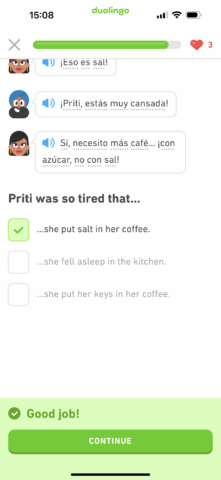
Day 3: I missed a streak, which the app informs me of on launch. Oops. Suitably chastised, I turn on notifications. Duolingo then starts a story, where I listen and read along. This is apparently preparing me for real conversation, although at this stage it’s all quite basic.
Day 4: I won my first streak freeze, which will be handy when I next miss a day. But Duolingo’s enforced advert after every exercise is already starting to irk. Perhaps you won’t mind if you do a single daily exercise, but it makes extended sessions staccato in nature.
Day 7: I’m making steady progress, but am confused by an answer. I tap ‘explain my answer’ and discover that’s an upsell for Duolingo’s ‘AI’ upgrade. I assume that’ll be based around ChatGPT. Given my experience with ChatGPT (it lies), I move on.
Day 10: I win a ‘night owl’ award because I remember at the last moment (well, 11:30pm) to launch Duolingo for the day. Not an achievement to strive for. I’m now finding the app usefully repetitive, with words and concepts being repeated to drum them in.
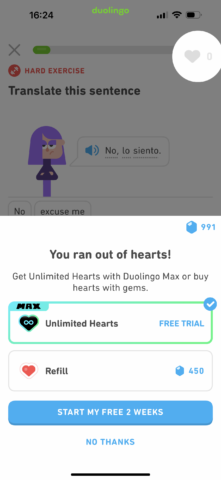
Day 14: I run out of hearts for the first time. You lose one of five on making a mistake. Now things are becoming more challenging, that’s not ideal. I’m told I can refill them for 450 ‘jewels’ – in-game currency, and half what I’ve so far accumulated. Or I can start a paid trial, or end my session and lose my progress. I feel stopped in my tracks.
Day 20: As Duolingo gets tougher, I’m making more errors. Sometimes, basic typos are allowed – but not always. I too often burn through hearts and have to abandon an exercise near the end. This feels a touch user-hostile; but, to be fair, none of this has cost me anything so far.
Day 21: Duolingo has a ‘league’ system, but I’m finding it’s not viable to keep getting promoted with the free app. I can’t win enough XP to keep up with league leaders. For science, then (and to better my promotion chances), I start a Super Duolingo trial. This removes ads and hearts limits, provides a mistakes review, and offers unlimited attempts at ‘legendary’ challenges that boost XP.
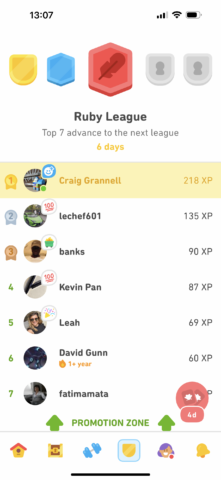
Day 30: I’m properly hooked. I use Duolingo only a little more now it’s ad-free, but the experience is better, and there are more tools for learning. I’m not sure how much Spanish has lodged in my brain, but I definitely know more than when I started.
30 days with Duolingo: verdict
The free Duolingo’s ads frustrate, but you do get a lot of app for no outlay. And the teaching appears effective. It might not make you fluent, but you can get a solid grounding in a wide range of languages. (Although, Duolingo: please add Icelandic!)
When you pay, the experience is far more pleasant, and the outlay feels reasonable – Super Duolingo costs about the same as up to six hours of one-on-one tuition, and yet you get it for a whole year.
My recommendation, though, is to find like-minded folks and grab a family plan. Unlike the Netflixes of this world, Duolingo states family plan members don’t have to be in the same household. So you can buy a year of learning for $19.99/£14.99 each, which feels like a bargain.
